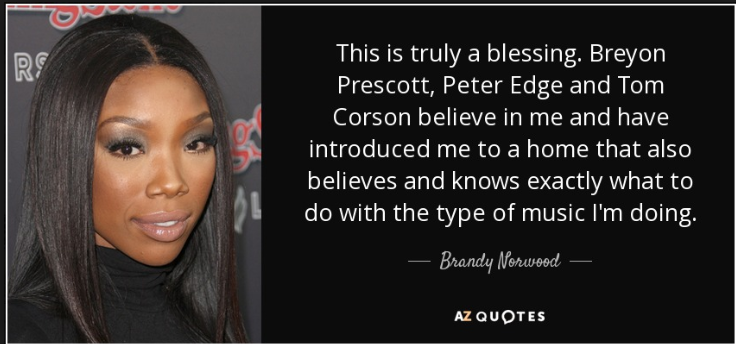Brandy, you’re a fine girl. But maybe not a good litigant. The pop/R&B/BET star has filed a lawsuit against Chameleon Entertainment, the production company she is signed to, claiming they stopped her from recording a new album and pulled the plug on a multi-album deal at RCA.
But that’s not exactly true. In January Brandy released a single “Begging and Pleading” on her own label (it’s available on iTunes) with no interference from Chameleon. It dropped on the night her new BET sitcom debuted. And RCA? She was dropped by them after the one album she made there, “Two Eleven,” sold just 180,000 copies in 2012. (Her name was removed from their website in 2013.)
Here’s some history: Brandy had huge multi million selling hits on Atlantic Records from 1994 to 2002. But her sales began to decline as tastes changed, downloading cut into sales, and her audience moved on. She went from selling over 1 million copies in 2002 with “Full Moon” to just 400,000 in 2004 for “Afrodisiac.”
Brandy left Atlantic at that point for Epic Records, which is part of Sony Music. Her 2008 album, called “Knockout,” bombed, selling just 214,000 copies. Epic, undergoing a leadership change, dropped her. Brandy’s run as an R&B pop queen was over.
Now without a label deal, Brandy signed a production deal (not a management deal) with Chameleon, run by Breyon Prescott. (Prescott also works with Jamie Foxx, and has been instrumental in his music career.) With no recent hits, Brandy’s career was cool to the touch. But Chameleon got her signed to RCA which was surprising because she’d failed in the Sony Music family already. Under Chameleon-RCA Brandy put out a good new album in 2012, the first of what was supposed to be a six album deal. “Two Eleven” gave her her first top 10 chart single in four years, called “Put it Down,” with Chris Brown.
RCA was not happy. The expense of promoting “Two Eleven” far exceeded money made from the paltry 180,000 copies sold. Plus, sources say, “Brandy was more interested in doing TV, movies and Broadway than in touring for the album.” She made less than a dozen appearances including three or four TV shows and three actual gigs. RCA cut their losses and dropped her. You’d think she was done at Sony Music for good this time.
But Brandy was still signed to Chameleon. In that time, Prescott had joined her old label, Epic Records — under the same Sony corporate banner — as RCA an A&R exec for black, or urban, music. Prescott, I’m told, managed to get Brandy a new contract at Epic. Only this time, the label asked for a 360 deal– one in which they would get a cut of her other businesses like tours and merchandise. That way, if a new album bombed, they’d be protected to some extent. (As touring has overtaken record sales in revenue, 360 deals are common nowadays.)
The deal, I’m told, was worth $600,000 with a $75,000 advance. Brandy balked, and never signed the contract. But there were no other offers. No other label wanted her, and so she did not make a new record.
That was two years ago. The Epic offer remains. (As for ‘double dipping’ — which Brandy accuses Prescott of– I can’t make sense of it myself. She’s still signed to Chameleon, and they’ve just managed to take her from one dead deal at Sony to a live one.)
In her lawsuit, Brandy accuses Prescott of blocking her from recording anything. But I found two recent releases that seem to negate that claim: in January 2016 she released the very retro “Begging and Pleading,” on her own label. (I found it on iTunes.) Chameleon didn’t protest or stop her from releasing it, sources say. They didn’t even know about it in advance.
In 2015, Brandy also re-recorded her vocals for a new version of one of her old hits (“The Girl is Mine”) which was released in the U.K. Again, Chameleon let it pass rather than raise a ruckus. “No one stopped her,” says an observer.
So far I haven’t seen mention of Brandy being dropped by RCA, snubbing a new Epic contract, or releasing new records without Chameleon’s permission, in any of the stories published this week. What I was able to find were Brandy’s tributes to Chameleon and RCA– as shown in the feature photo with this story.
What’s complicated the story is that Brandy, critics say, uses her music as a tool to promote her acting career. Her critics say she doesn’t seem to get that the majors are not knocking her door down. In the environment of the record business now, she’s lucky to have a deal. (I can think of dozens of former pop stars who don’t have any label.)
“When she got the new show on BET”– a sitcom called “Zoe Ever After”– “she wanted to put out a single. She just put out Begging and Pleading without asking anyone at Chameleon. And no one objected. But look, it just sat there. It didn’t do a thing. All she had to do was sign her Epic contract and start making records. That’s all she has to do. No one is stopping her.”

